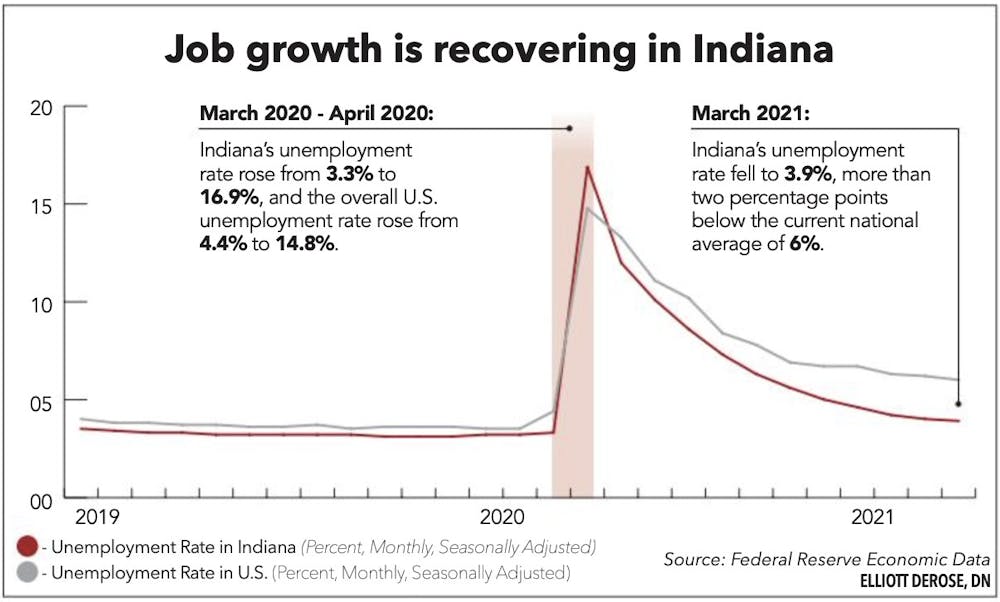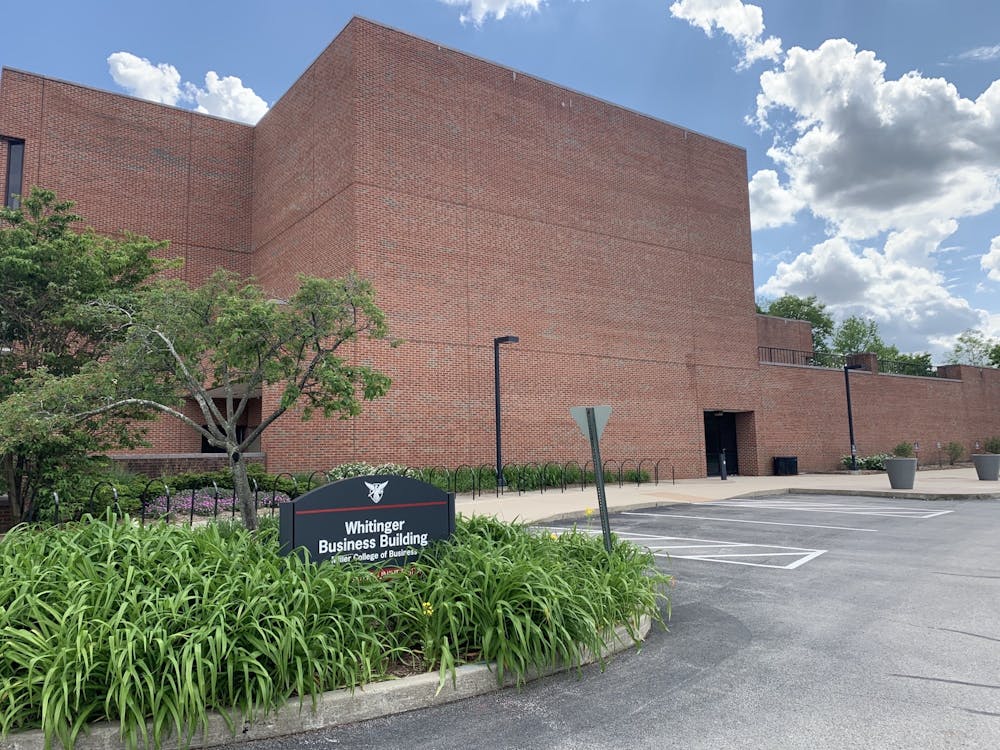Job skills in demand
- Cloud computing
- Artificial intelligence
- Sales
- Analysis
- Translation
- Mobile app development
- People management
- Video production
- Audio production
- Industrial design
- Creativity
- Collaboration
- Adaptability
- Time management
- Persuasion
- Digital journalism
- Animation
Source: Indeed.com
More than 3 million students are expected to earn degrees from colleges and universities this spring, according to the National Center for Education Statistics. Those students will enter the job market as the nation continues to recover from the COVID-induced recession, which the National Bureau of Economic Research states began in February 2020. However, new and recent college graduates may be in a better position than other candidates seeking new careers.
“For recent college graduates, the COVID job market has mostly been reasonable,” said Michael Hicks, director of Ball State’s Center for Business and Economic Research. “Employment by income category among [high-wage workers], which are mostly college graduates, actually rose through 2020. The employment outcomes for those workers were reasonably good … For most college graduates, the job market now is a little bit better than a typical recession year, better than other workers, but not one in which job options are as plentiful as one would like.”
Though college graduates are beginning to see more job opportunities, this wasn’t always the case during the pandemic. The Federal Reserve Bank of New York reported recent graduates ages 22-27 experienced higher rates of unemployment than the general workforce from March to October 2020. People with college degrees who are older than 28 have consistently recorded lower unemployment rates than the general population.

Developing skills
Because the 2020 recession was driven by the COVID-19 pandemic, chair of the Department of Economics John Horowitz said unemployment will likely recover at a quicker pace in the next few years than it did after the 2008 recession.
“In previous recessions, you didn’t require people to stay home,” Horowitz said. “That’s why some economists talked about how the people who have jobs where they can work from home often have done better and have more disposable income … On the other side is people whose work has been shut down and they didn’t have money anymore, and, maybe, it took a little bit for them to get unemployment [benefits].”
The United States unemployment rate dropped after the federal unemployment benefits of $600 per week ended in July 2020, which Horowitz said likely prompted people to search for and accept jobs.
One of the most important strategies in searching for a job is networking, Horowitz said. He recommends students reach out to people in the job sector they are interested in for an interview or shadowing opportunity.
“It helps to go out, and interview people, and ask them about what they do and ask for recommendations on who else to talk to,” Horowitz said. “A lot of times, that will tell you whether that’s something you want to do, and, secondly, it will tell them that you’re somebody who goes out and makes personal connections.”
Developing job skills even after earning a degree is another job-searching approach Horowitz suggested.
“What firms tend to be looking for is people who can write, people who can speak clearly and concisely and are conscientious about getting things done and knowing the language of business,” he said. “A lot of these jobs want knowledge of computers or other software where you’re able to analyze different situations.”
Though it is still more difficult than usual for graduating seniors to find a job, Horowitz said, networking and professional development can provide students with more opportunities.
Building a resume
Jon Thornburg, 2011 economics graduate, has worked at First Merchants Bank since he graduated. Thornburg is the vice chair of the Economic Department Alumni Advisory Board.
Part of his job on the advisory board, Thornburg said, is to help students and graduates make connections with alumni. He said students getting ready to graduate should ask professors if they know anyone who can help them find jobs.
“It really is dependant upon the student or the graduate to ask for help and make those connections,” Thornburg said.
Thornburg said he used to hire people for entry-level positions at First Merchants Bank before receiving a promotion. He advises students to proofread their resumes for spelling and grammar and be prepared to answer questions about certain data they choose to include.
“A lot of business majors put something quantifiable, like ‘I increased this by Xpercent,’” he said. “Just expect that when you get to the interview, I’ll ask you ‘How did you determine that you did this?’”
Thornburg said he advises students to try to tell stories about themselves with their resumes and set themselves apart from other applicants, particularly by emphasizing transferable skills, such as writing, communicating or leading a team.
“It’s also important, while you’re in school, that you’re taking advantage of opportunities that exist,” he said. “I used to look for the things people did while in school outside of classes and what they took away from that experience.”
Especially when looking for a first job out of college, Thornburg said students should try to find a job they want, but not be reluctant to start at a lower position.
“I think a lot of people are afraid to take a job that they think is beneath where they should start,” he said. “I would strongly encourage people that — although you want to work toward that place where you can find the right fit — don’t be afraid to take that job that is maybe not the fit you want right now, but could lead you there eventually.”
Thornburg also encourages students to include part-time work that might not be relevant to where they’re applying.
“One of the most common questions I get asked is: ‘Should I include working at somewhere unrelated to my specific field,’” he said. “My recommendation is include working McDonalds, because I think it communicates to someone reading your resume you’ve gained some skills, be it time management, communicating with upset customers or a variety of things.”
Making connections
Allen Hutson, 2008 economics graduate, currently works at Global Gas and Electric Kentucky Utilities. He said after graduating into a recession, it took him about 13 months to find his first professional job.
Hutson estimated he applied to 500 jobs before getting hired. He said that process was “one of the worst things [he] ever had to do.”
Getting interviews and job offers during the COVID-19 pandemic, Hutson said, might be harder than the 2008 recession because there are easier ways to apply online for jobs, causing more competition for each opening.
“The tought part about both situations is I delt with having people who were overqualified for jobs, and the hiring managers thought, ‘We have to pay this person more, but they have a track record,’” he said. “The competition was much stiffer.”
Compared to the economic recovery after 2008, Hutson said he expects the job market to bounce back quicker after the COVID-19 pandemic’s effects on employment subside. As students hopefully find more available jobs by next year, Hutson recommended LinkedIn Learning as a resource to develop professional skills.
He said using Excel proficiently is something expected by employers, and learning a programming language like R or Python could be useful for data analysis.
“You don’t have to go deep into this sort of stuff, just a basic understanding would be really valuable,” Hutson said.
Some LinkedIn Learning classes may be worth putting on a resume, Hutson said, especially data analysis.
When applying for jobs, Hutson said graduates are probably better off applying for a smaller number of openings and making connections with people who work at the company than applying for hundreds of openings.
“Don’t make the mistake of thinking that applying to every job out there is better than the value of even a newly-made connection,” he said. “Reach out and use those social media contacts and try to figure out how to talk to a real person [in the application process]. Those connections are so much more valuable than 30 applications.”
Looking forward
The unemployment rate has recovered since the Bureau of Labor Statistics reported more than 11 million jobs were lost between February and August 2020 but not to pre-pandemic levels.
Fortunately, for soon-to-be graduates, Hicks expects to see opportunities become more widely available as the economy continues to recover.
“2021 looks fairly strong,” Hicks said. “I think the expectation is significant growth in labor demand, particularly for educated workers, which has been the hallmark of the last two decades. So, college graduates, for the most part, are doing fairly well.”
Hicks said he thinks college graduates will benefit from what he predicts will continue to be a growing job market.
“We just came through a very long period of economic growth,” Hicks said. “It wasn’t fast, but college graduates did disproportionately well … So, even with this downturn, employment options for graduates remain fairly strong.”
Contact Grace McCormick with comments at grmccormick@bsu.edu or on Twitter @graceMc564. Contact Garrett Chorpenning with comments at gachorpennin@bsu.edu or on Twitter @gachorpenning.





